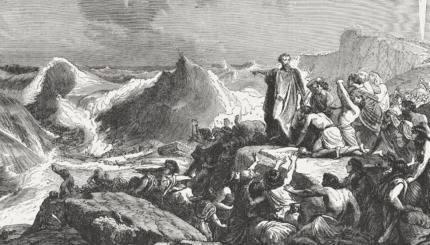Last night everything changed. I knew they were going to change when I got to the polls at 6AM on Tuesday morning and the wait to vote was an hour long, but as I sat watching the results come in last night I kept thinking about just what had happened, and just how different the world is going to be from now on.
A friend of mine’s facebook status explains, “if you want to see what it looks like when the people go out of Mitzrayim, look out your window.” Part of me think that’s a little extreme, but a bigger part of me thinks it’s right on. Clinking glasses with my roommates last night, and watching the Obamas and Bidens hugging each other on stage, Oprah and Jesse Jackson weeping in the crowd–it felt more like redemption to me than anything I’ve ever felt at a Pesach seder.
Inspired by facebook and the glory of last night I came in this morning and did some reading about spiritual redemption and spent a few minutes puzzling over these two paragraphs:
In his commentary on the Torah, Rabbi Obadiah Sforno (Exodus 6:7) remarks that God uses four different expressions of redemption in reference to the exodus, and that each of these expressions corresponds to a different phase of our true redemption. The first, “Vehotzaiti,” or “and I will extract you,” symbolizes the cessation of physical slavery. The second, “Vehotzalti,” or “and I will save you,” refers to the Jews actually leaving the land of Egypt. The third, “Vega’alti,” or “and I will redeem you,” marks the Jews’ crossing of the Red Sea and the destruction of their tormentors. But the final expression and final stage of the exodus, “Velakachti,” or “and I will take you,” was not completed until the Jewish people accepted the Torah at Mount Sinai. Â
Simply put, the reason why the Jewish people were taken out of Egypt was to receive the Torah. The exodus alone granted us physical freedom, but it was freedom without purpose. It was the acceptance of the Torah at Sinai that solidified our nation-hood, as the verse mentioned above says, “and I will take you to me for a people and I shall be a God to you.” There is a one-to-one connection between the covenant with God and the Jews’ status as a people.
The metaphor breaks down a little bit, but what I take away from this is a sense of needing to look forward to the other steps of our redemption. It’s not enough to have voted yesterday–now we need to work together to make serious changes in our lives and in the way our country works. When we’ve solved the social security crisis, ensured that all Americans have health insurance, ended unnecessary wars, and begun to deal with the huge problems of energy, poverty and ecology then maybe we can feel as if we’re nearing the “Velakachti,” stage. Right now, we’ve just tossed off the shackles of the last few years. We won’t really be leaving Egypt until January 20th, and then there’s a lot of work to be done to get across the Red Sea and into the Promised Land.
That said, I’m looking forward to the journey.
Pesach
Pronounced: PAY-sakh, also PEH-sakh. Origin: Hebrew, the holiday of Passover.
Torah
Pronunced: TORE-uh, Origin: Hebrew, the Five Books of Moses.



